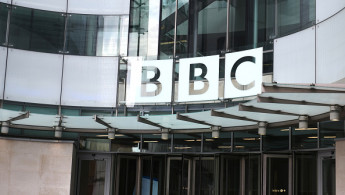BBC correspondent resigns over Israel-Gaza coverage, latest in storm of controversies
A BBC correspondent has resigned in protest at the broadcaster's coverage of the Israel-Gaza conflict amid a whirlwind of controversies over the framing of the conflict, which has left around 3,500 Palestinians and 1,300 Israelis dead.
Bassam Bounenni, the BBC's North Africa correspondent, said in a social media post on Wednesday that he had handed in his resignation to bosses.
Writing in Arabic on X, formerly Twitter, he said: "This morning, I submitted my resignation from the British Broadcasting Corporation, BBC, for the sake of my professional conscience."
Bounenni, who is based in Tunis and has covered the Middle East and North African affairs for 15 years - previously with Sky News Arabia and Al Jazeera - said the decision to quit his role was over the corporation's coverage of the Israel-Gaza conflict.
It comes after the killing of around 500 Palestinians at a hospital on Tuesday evening which Palestinians have blamed on an Israeli airstrike.
The BBC has received a barrage of complaints for its reporting on the Israel-Hamas war. The publically owned corporation, which was established in 1922 and aims to be "impartial", is principally funded by TV licence fees paid by UK households.
On Monday, just a day before the bombing of the Al-Ahli Hospital in Gaza City in which hundreds of civilians died, the BBC aired a discussion on whether there are Hamas tunnels under hospitals and schools in the Gaza Strip.
It was criticised on social media and highlighted on X by well-known British-Iraqi rapper and activist Lowkey in the wake of the hospital attack.
He reposted the BBC post, adding the caption: "24 hours after the BBC tweeted this, Israel bombed the Baptist Hospital in Gaza. It was sheltering patients and displaced people. It is estimated up to 300 people were killed." That figure has risen to 471 Palestinians dead and over 380 injured.
24 hours after the BBC tweeted this, Israel bombed the Baptist Hospital in Gaza. It was sheltering patients and displaced people.
— Lowkey (@Lowkey0nline) October 17, 2023
It is estimated up to 300 people were killed. https://t.co/t6ktRAjs02
The article was from the 'Your Questions Answered' daily segment in which readers' questions on the conflict are addressed by senior reporters.
Lyse Doucet, the BBC’s chief international correspondent currently reporting from southern Israel, answered the question from an anonymous reader: "Please can you elaborate on where the Hamas tunnels are and if they do build them under hospitals and schools?"
"Tunnels are used to transport goods and people, store weapons and ammunition, and shelter command and control centres," Doucet said.
"Such a vast underground network, on such a small sliver of land, seems likely to wind under densely packed neighbourhoods of homes, hospitals and schools.
"There have been reports that some passages have entrances located on the bottom floors of houses, mosques, schools and other public buildings to allow militants to evade detection."
Israeli authorities repeatedly made unverified accusations that Hamas uses human shields and stores weapons near civilian infrastructure, contributing to the high number of casualties in Gaza.
The BBC’s coverage of the Israel-Gaza war has split opinion. Liberal and left-wing groups have accused it of bias toward Israel, while conservative commentators have alleged the opposite.
Last weekend, its London headquarters were doused in red paint by Palestine Action, a Palestinian rights activist group, in protest at the corporation's coverage of the conflict which the group alleged made it "complicit in genocide”.
On the other side of the debate, politicians from the governing Conservative Party, including Defence Secretary Grant Shapps, have criticised the BBC's editorial policy for not calling fighters from the Hamas movement - which rules Gaza - "terrorists".
On Tuesday the BBC was forced to offer an apology after admitting it misled viewers when it described last weekend's pro-Palestine protests in the UK, which drew tens of thousands of people including British-Jewish demonstrators, as "pro-Hamas".




 Follow the Middle East's top stories in English at The New Arab on Google News
Follow the Middle East's top stories in English at The New Arab on Google News
![A group of Palestinians, foreign and Israeli activists gather to participated in an olive picking event on the land in the town of Battir, which is under threat of confiscation by Israel in Bethlehem, occupied West Bank on 8 November 2024. [Getty]](/sites/default/files/styles/image_330x185/public/2182930803.jpeg?h=199d8c1f&itok=__0LgGsa)

![People gathered around the rubble of destroyed houses to search for survivors [Getty]](/sites/default/files/styles/image_330x185/public/2024-11/GettyImages-2184733820.jpg?h=199d8c1f&itok=NiM1LO2f)